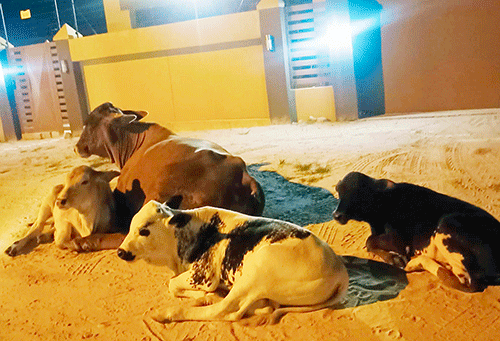Auleria Wakudumo
Ongwediva – Residents of Ongwediva and Oshakati have voiced growing frustration over the increasing number of animals, particularly cattle, pigs and dogs roaming freely through the streets and residential areas.
Some homeowners say the situation has worsened over recent months, with animals not only wandering the streets, but also sleeping in front of houses.
One resident said the front of his house has turned into a kraal.
“Every night, cows come sleep right outside my door. In the morning, we wake up to a mess of animal dung. You literally have to chase them away before you can even start your day,” he lamented.
Some residents fear the damage could escalate, as some properties have no protective barriers strong enough to keep larger animals like cows out.
Town council response
The Oshakati Town Council’s spokesperson Katarina Kamari stated that the issue of animals in town is of serious concern to the town council.
“We have observed a growing problem with communal farmers surrounding Oshakati allowing their livestock to roam freely within the town’s boundaries. This not only poses a safety risk to motorists and pedestrians, but also leads to property damage and general discomfort for our residents,” she noted.
Kamari added that the town council currently operates a pound facility where stray livestock are impounded. However, due to the increasing number of roaming animals, the facility is often filled to capacity. Despite these challenges, the town council will continue to issue fines to livestock owners whose animals are found in town, as per the regulations.
“To strengthen enforcement, the council has employed four temporary workers, specifically tasked with driving and impounding stray animals found within townlands. Additionally, budgetary provision has been made in the upcoming financial year to outsource a dedicated company which will focus solely on impounding livestock in town,” she said.
The town council is also considering increasing the fines for impounded animals to discourage repeat offenders and reinforce responsible ownership.
“This is necessary to ensure public safety and protect property, as stray animals have contributed to road accidents and damage to homes,” she reiterated.
The Ongwediva Town Council issued a formal warning to cattle herders on 26 March, urging them to take responsibility for their animals and keep them away from the town area.
The town council’s spokesperson, Ottilie Shingenge stated that allowing animals to roam freely violates regulations under the Local Authorities’ Act, Act No 23 of 1992.
She added that the continued presence of livestock in towns discourages tourists and potential investors, which could ultimately affect Ongwediva’s economic growth and attractiveness as a business hub.
Cattle herders
Cattle herders in surrounding villages told New Era that it becomes difficult when taking care of animals, as their villages are too close to town.
Mateus Ngenoveno, a resident of Okahenge in Ongwediva, shared that he takes his animals to graze in Ehenye, Oshakati.
“The grazing land there is spacious enough for the animals to move freely. Also, the Oshakati Town Council is not as strict as the Ongwediva Town Council when it comes to animals in town,” he said.
Another source, a resident of Oshinyadhila No 4, acknowledged that while development is important, town councils should also be mindful that their expansion often encroaches on village areas.
“We know that some people sold their land to the town council and relocated, but there are still others who did not. It becomes difficult for us as we are being forced to change our way of life, “he said.
Residents stated that they have been instructed to keep their animals at least 500 metres away from town.
Suggestions: keep the town clean
The cattle herders suggested that town councils should take greater responsibility in maintaining cleanliness in their towns.
“If you look at Ongwediva and Oshakati, some areas even look like they have overgrown with long grass. Animals are drawn to these areas because they think they are grazing land,” they said.



